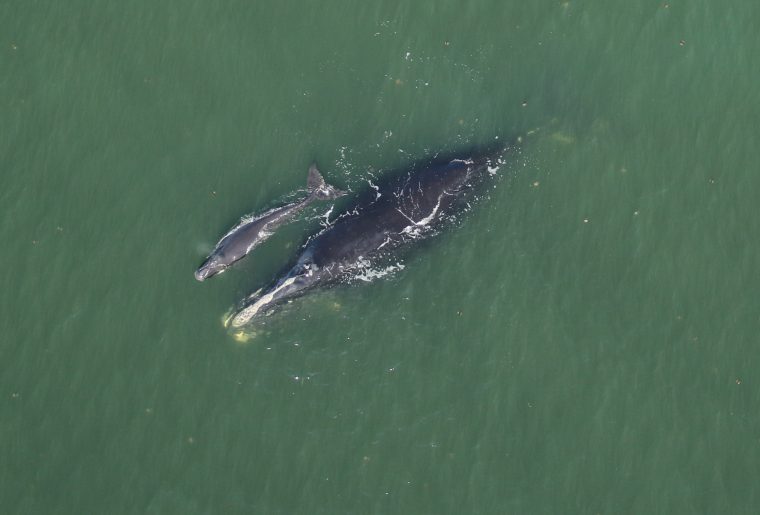Please note: We strongly recommend purchasing your tickets in advance to guarantee entry, as we do sell out on weekends and during school vacation week (April 15–19). A limited number of tickets will be available onsite for walk-up purchases when we open at 9:00.
Female whales feeding in this habitat are more likely to give birth

BOSTON, MASS. (July 26, 2022) – As scientists venture into Canadian waters to research North Atlantic right whales this summer, a recent study is revealing the importance of the Gulf of St. Lawrence habitat for the critically endangered species.
The paper published in Frontiers in Marine Science by Ana Bishop of the University of South Carolina, and co-authored by others at the University of South Carolina, New England Aquarium, National Marine Fisheries Service, and University of Otago, explored the impact of female right whales’ family structure on habitat use and reproductive success. Researchers reviewed the calving histories of all females from 1980 to 2021 and found that calves of mothers with high reproductive success were more likely to have higher reproductive success themselves. The study also revealed that sexually mature females that have fed in the Gulf of St. Lawrence since 2015 were significantly more likely to give birth over this time period compared to right whales who fed elsewhere.
“The findings are particularly important because the Gulf of St. Lawrence is a relatively new habitat for this species, and we are still assessing how well the whales fare there,” said Philip Hamilton, a senior scientist at the New England Aquarium’s Anderson Cabot Center for Ocean Life. “A previous study suggested that the foraging in the Gulf may not be adequate to support reproduction, but our results suggest that this might not be the case.”
The Gulf of St. Lawrence in Canada is a major habitat for North Atlantic right whales. As climate change has driven whales out of the traditional summer feeding waters in the Bay of Fundy, some whales are pursuing waters further north. Over the past several years, 40% of the species has been found in the Gulf of St. Lawrence during the summer months.
Periods of decreased reproduction have played a key role in the overall decline of the North Atlantic right whale, one of the most endangered large whale species in the world with an estimated population size of less than 350. The researchers noted in the study that it is critical to understand the more nuanced factors driving female reproductive success as well as what is driving right whales to seek out certain habitats as these whales face ongoing threats from human activities, including entanglements in fishing gear and ship strikes.
Scientists with the University of New Brunswick, Canadian Whale Institute and the Aquarium are spending time aboard joint research cruises this summer in the Gulf of St. Lawrence, examining all aspects of right whale activity in the habitat. The scientists spent two weeks on the water this month and will have another two weeks in August to gather photo identification data, perform health assessments, and collect plankton and oceanographic samples. This is the seventh year the New England Aquarium has conducted research in the Gulf. Researchers are sharing regular updates about their time at sea via a live blog on neaq.org.
For 40 years, the New England Aquarium’s Right Whale Research Program has extensively studied this critically endangered species. Scientists focus on solutions-based work, conducting critical science, collaborating with fishermen on new techniques to reduce deadly entanglements in fishing gear, facilitating communication across the maritime industry to reduce vessel strikes, and working with government agencies and lawmakers locally, nationally, and internationally to develop science-based protections for the whales.
MEDIA CONTACT:
Pam Bechtold Snyder – psnyder@neaq.org, 617-686-5068
